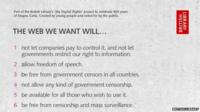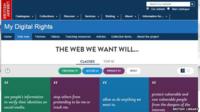

-
15 June 2015
- From the section Technology

The British Library has revealed the current top 10 clauses people would like to see in a Magna Carta for the digital age.
About 3,000 people aged 10-18 debated the issues and came up with 500 clauses they would like to see in such a document.
Now the public can have their say.
The current number one is: “Not let companies pay to control it, and not let governments restrict our right to information.”
The voting project, called My Digital Rights, marks the 800th anniversary of Magna Carta and the 25th birthday of the world wide web.
Judging by the current top 10 – voted on by more than 30,000 visitors to the British Library’s website – people clearly want the internet to be an impartial source of information for all, free from government censorship and surveillance, and free from commercial control.
However, the issues concerning most young people who took part in the debates and workshops were safety and cyberbullying, in contrast to those concerning the public in general.

“It has been fascinating to see how the public’s top clauses have compared to those of the thousands of students who have co-created this ‘Magna Carta for the digital age’,” says Sarah Shaw, the British Library’s project manager of Magna Carta: My Digital Rights.
“The project was conceived to encourage young people to think about issues of privacy, access and freedom, raised by Magna Carta, in the digital age.
“These ‘Top 10’ clauses we have revealed today show a snapshot of how the public feel at this 800th anniversary moment about our rights and responsibilities on the web.”
Magna Carta was granted by King John of England on 15 June 1215, establishing that the king was subject to the law rather than being above it.

The Top 10 most popular clauses so far
- The Web we want will not let companies pay to control it, and not let governments restrict our right to information
- The Web we want will allow freedom of speech
- The Web we want will be free from government censors in all countries
- The Web we want will not allow any kind of government censorship
- The Web we want will be available for all those who wish to use it
- The Web we want will be free from censorship and mass surveillance
- The Web we want will allow equal access to knowledge, information and current news worldwide
- The Web we want will have freedom of speech
- The Web we want will not be censored by the government
- The Web we want will not sell our personal information and preferences for money, and will make it clearer if the company/Website intends to do so

The joint project has involved the British Library, the World Wide Web Foundation, Southbank Centre and the British Council.
The voting is still open so the British Library expects the Top 10 to change over time.
Sir Tim Berners-Lee, the inventor of the world wide web, has voiced his support for the project.
“It’s important for young people to think about the future now, when we are deciding what sort of a future it will be.
“It’s going to be a future they will have to live in,” he said.
- You can hear a feature about this project on last Friday’s Tech Tent radio show from the World Service.

